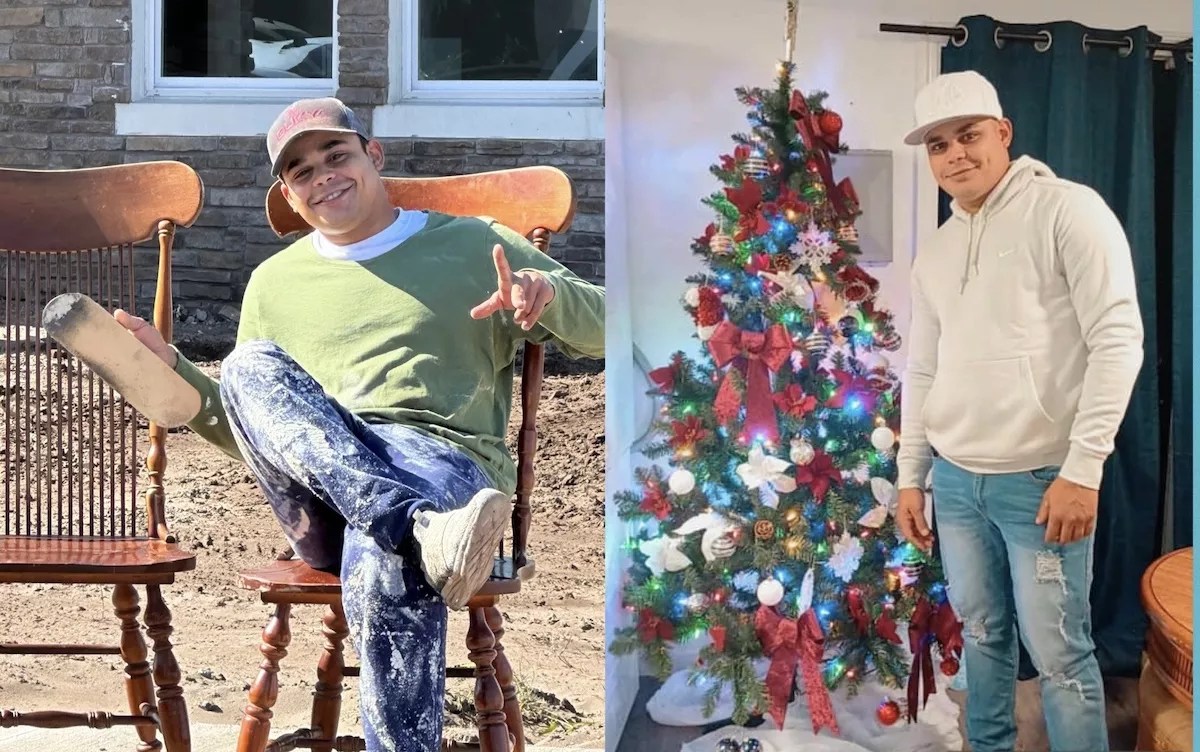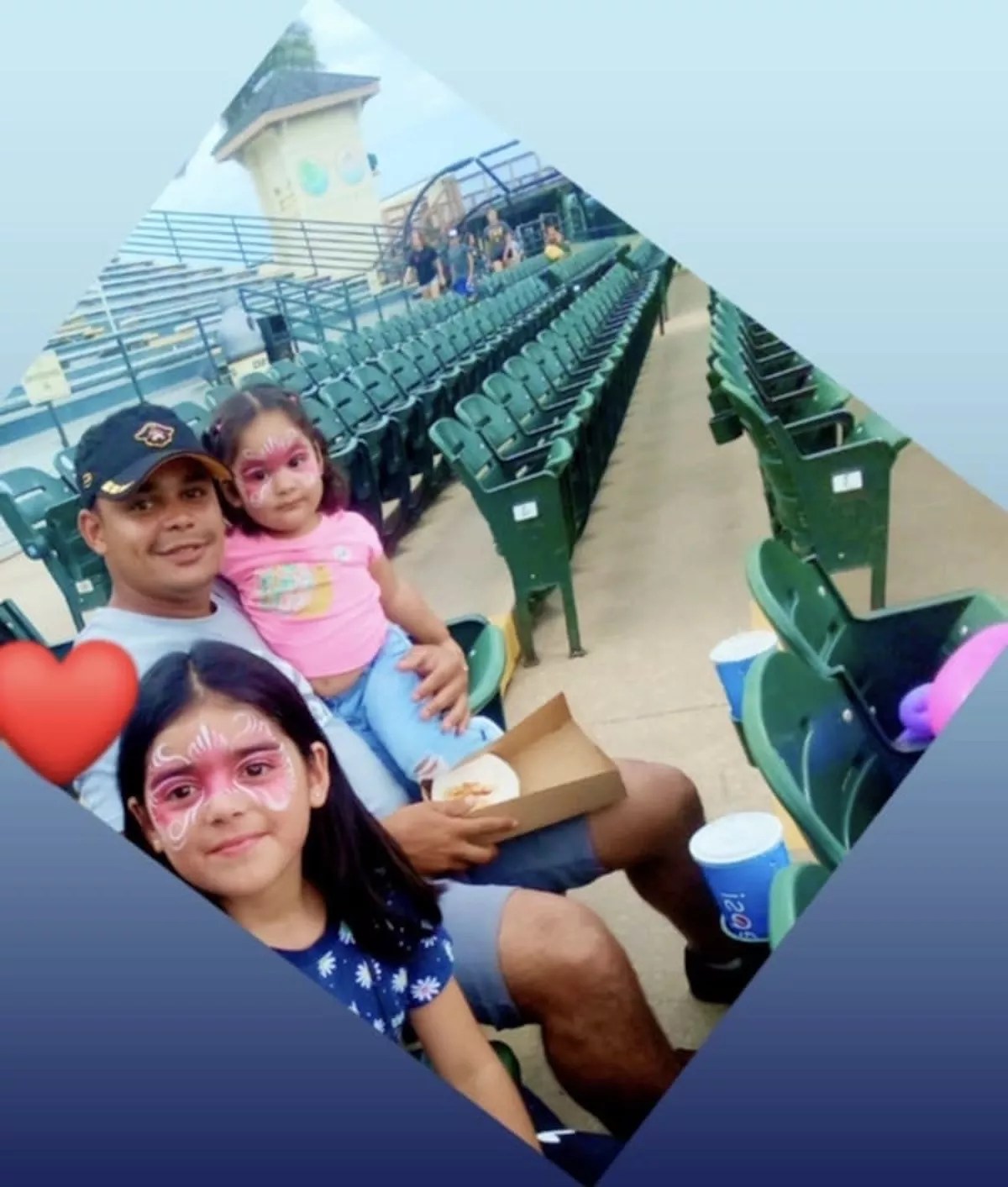
Photos by Angela (Marcano’s girlfriend)

Audio By Carbonatix
Luis Carlos José Marcano Silva was born and raised on the beach-lined island of Margarita in Venezuela. The laid-back island, known for its crystal clear waters and once nicknamed the “Pearl of the Caribbean,” is situated off the coast of the South American nation, 200 miles northeast of Caracas.
Like many Venezuelans, the 26-year-old was forced to leave home when Venezuela descended into a political, economic, and humanitarian crisis. In November 2023, Marcano and his girlfriend, Angela*, along with their two young children, journeyed to Mexico and crossed the Rio Grande River on foot in search of a better life in the United States. *Angela is identified only by her first name in this story to safeguard her identity.
The family soon traveled by bus to Bradenton, Florida, where they settled down and applied for asylum. But after living and working in the coastal city for almost two years – and experiencing no issues with the immigration system – Marcano has vanished while in the custody of United States Customs and Immigration Enforcement (ICE).
Marcano is one of nearly 300 U.S. migrants recently deported to a notorious Salvadoran prison with little or no due process under a little-known law called the Alien Enemies Act. Recently invoked by President Donald Trump for the first time since World War II, the controversial 1798 wartime law is now being employed ostensibly to target alleged members of a Venezuelan gang known as Tren de Aragua.

Angela, Luis, and their two young daughters.
Photo by Angela (Marcano’s girlfriend)
As is the case with many of the other Venezuelan men recently brought to El Salvador, Marcano’s family insists that he has no affiliation whatsoever with the violent gang, which the U.S. recently classified as a foreign terrorist group. They argue the only thing Marcano ever did wrong was to enter the U.S. illegally, and that he was in the process of seeking asylum through this country’s notoriously backlogged system when he was detained.
Members of Marcano’s family say they haven’t heard from him in more than ten days. The last time Angela spoke with him, on March 15, he was on U.S. soil and told her officials were planning to deport him back to Venezuela.
That never happened.
Instead, days later, she spotted her his name on an Instagram livestream that listed 238 Venezuelan men who had been taken to a maximum-security prison in El Salvador – a country where Marcano had never set foot in his life.

Luis and his two young daughters.
Photo by Angela (Marcano’s girlfriend)
“I didn’t hear from him again,” Angela tells New Times.
According to photojournalist Philip Holsinger, who witnessed the men’s arrival at the El Salvador prison, guards kicked, slapped, and shoved them, then shaved their heads. Packed 80 to a cell with bare steel planks for beds and no mats or pillows, they were forbidden to speak, read, or make phone calls.
“For these Venezuelans, it was not just a prison they had arrived at. It was exile to another world, a place so cold and far from home they may as well have been sent into space, nameless and forgotten,” Holsinger wrote in a March 21 dispatch published in Time magazine. “Holding my camera, it was as if I watched them become ghosts.”
Angela struggles to understand how Luis vanished into a foreign prison without warning. She explains the two of them and their children attended an immigration appointment in January 2024, at which time the court scheduled another hearing for February 27 of this year.
But she says Marcano received a letter from ICE’s Tampa office asking that he show up to court on February 5. When he did as requested, she says, he was detained and taken to a federal prison in Miami and then transported to Texas.
A spokesperson for ICE in Tampa has not responded to a request for comment for this story.
Angela says the family’s former attorney said Marcano’s tattoos, particularly a crown inked on his chest, likely contributed to his deportation. (Angela says they stopped consulting with the lawyer because they felt they were being financially exploited.)
Marcano has several tattoos: one, on his belly, depicts the face of Jesus of Nazareth; another, on his arm, displays an infinity symbol; a third bears the name of his daughter, Adelys. Angela says Luis got the crown tattoo with an ex-girlfriend in Venezuela when he was 19; his bears the phrase “Una Vida” (“One Life”), while hers says “Un Amor” (“One Love”).
Experts have said Venezuelan gangs aren’t identified by tattoos and that tattoos aren’t closely connected with affiliation to Tren de Aragua. But law enforcement officials have nonetheless included the five-point crown on a list of tattoos to help identify members of the violent gang.
Luis Marcano wouldn’t be the only Venezuelan to be tied to Tren de Aragua, potentially over a crown tattoo.
One man who fled Venezuela in 2022 after joining anti-government protests was linked to the gang and recently deported to El Salvador. His attorney said his crown tattoo “may be why ICE falsely accused him of gang membership.”
“However, this crown is not related to Tren de Aragua but rather a tribute to his grandmother whose date of death appears at the base of the crown,” the lawyer said.
A 24-year-old man, whose attorney said he fled political persecution from the Maduro regime, has tattoos of a rose, a clock, and a crown with his son’s name on it. His deportation document reportedly described his tattoos as “gang-related.”
“The tattoos are well-known tattoos that Tren de Aragua gang members tend to have. Subject denied being part of Tren de Aragua or any other gang,” the document read.
Meanwhile on Margarita, residents have been rallying in the streets, demanding Marcano’s release.
One video shared on Instagram shows Marcano’s tearful mother standing alongside her husband and other loved ones while holding a sign that reads, “Mi hijo no pertenece al Tren de Aragua. Justicia para Luis Carlos José Marcano Silva.” (Translation: My son does not belong to Tren de Aragua. Justice for Luis Carlos José Marcano Silva).
The protest appears to have attracted several dozen people, including the parents and loved ones of other Venezuelan men recently banished to El Salvador.
Marcano’s mother, wearing a shirt with the Virgin del Valle, Margarita’s patron saint, says she’s desperate for her son to return home.
“Having a tattoo is not a crime,” she told the crowd of protesters.
Angela describes her boyfriend as a caring and devoted father who loves watching movies and has little interest in parties. She recalls how his daughters would eagerly wait by the door for him to return from his day jobs as a painting and tiling contractor. She says they don’t fully grasp what’s happening now and believe their dad is simply at work.
“His smallest daughter is looking at his pictures all the time, saying how she misses and loves him,” she tells New Times.